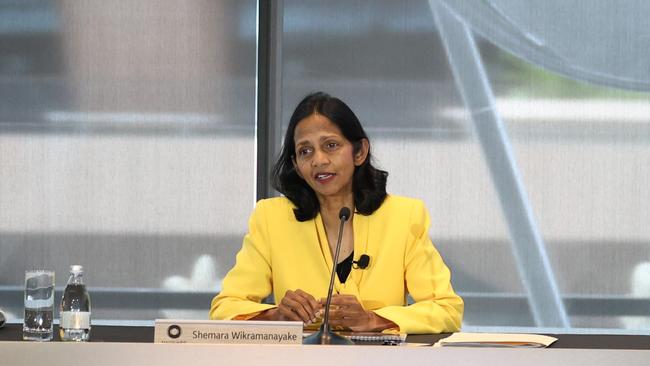Macquarie Group to make public markets push into active exchange-traded funds
Macquarie is evolving its public markets businesses by making a bigger push into active exchange-traded funds, as it grapples with unfavourable foreign exchange movements and fund outflows.

Business
Don't miss out on the headlines from Business. Followed categories will be added to My News.
Macquarie Group is evolving its public markets businesses by making a bigger push into active exchange-traded funds, as it grapples with unfavourable foreign exchange movements and fund outflows.
The asset manager’s interim results on Friday showed the amount Macquarie managed in publicly traded investments such as shares and bonds fell 4 per cent to $543.2bn in the six months ended September 30, from the prior half. The drop in assets under management spanned equities, fixed income and multi-assets. The results presentation showed Macquarie had 10 active exchange-traded funds (ETFs) across the US and Australia and chief executive Shemara Wikramanayake said it was an area of increased focus.
“We are typically in active strategies and what you’ve been seeing in the markets during this period is money flowing more to passive strategies, and also coming in through ETFs, so what we are doing is responding to that,” she added.
“We’re just trying to see the investment opportunities the way investors want to access them, just like in private markets.”
But some analysts questioned why Macquarie was seeing outflows in its public markets division and whether there were performance and other pressures emerging.
“Two-thirds of our funds are beating their peer benchmarks over a three-year period so the underlying funds we have are performing well,” Ms Wikramanayake said on Friday.
“We are evolving what we offer but I would say over all our public investments business is one that is really at scale now, so we have a big revenue line compared to a reasonably fixed cost line … While numbers on the revenue side have come off a bit we are still earning very strong annual income and ROE (return-on-equity) on that business.”
About three years ago, Macquarie acquired AMP Capital’s global equities and fixed income business for a consideration of up to $185m.
Macquarie on Friday said it was a top three active ETF manager in Australia based on net flows on the ASX between April and September 30 this year.
Fund managers globally have been hit with pressure on fees and a wave of investor money heading toward cheaper and passive investment options.
Macquarie’s private markets business, within the asset management unit, had $373.6bn under management at September 30. That was up just 1 per cent on the prior six months.
Some $7.2bn in new equity was raised during the half by Macquarie from its customers across fund strategies spanning energy transition, regional and global infrastructure, infrastructure secondaries, agriculture and private credit.
The Australian last month revealed Macquarie was kickstarting a fundraising drive for its fourth Asia-Pacific infrastructure fund in an attempt to attract about $US5bn and capitalise on positive investor sentiment from bumper fund asset sales including AirTrunk.
Macquarie’s 60 per cent holding in AirTrunk was held via its second Asia-Pacific Infrastructure Fund and banking analysts have estimated the group may reap performance fees as high as $1.3bn from the sale. That fund still holds about seven assets and Ms Wikramanayake said performance fees would be booked over time.
In its interim results on Friday, Macquarie’s asset management unit booked performance fees of $403m, up from $236m in the same period a year earlier.
Macquarie has also been bulking up in private credit but that is conducted through its investment banking division, rather than the asset management arm.
As at September 30, Macquarie’s committed private credit portfolio expanded to more than $22.5bn, with about $5bn deployed during the half.
The private credit, or non-bank and direct lending sector, has ballooned in size in recent years and now sits at about $US2 trillion globally.
The accelerating growth has, however, piqued the interested of regulators in Australia and globally given a lack of transparency around valuations and lending practices.
The Reserve Bank’s latest bulletin estimated there was $40bn in private credit outstanding in Australia.
More Coverage
Originally published as Macquarie Group to make public markets push into active exchange-traded funds




